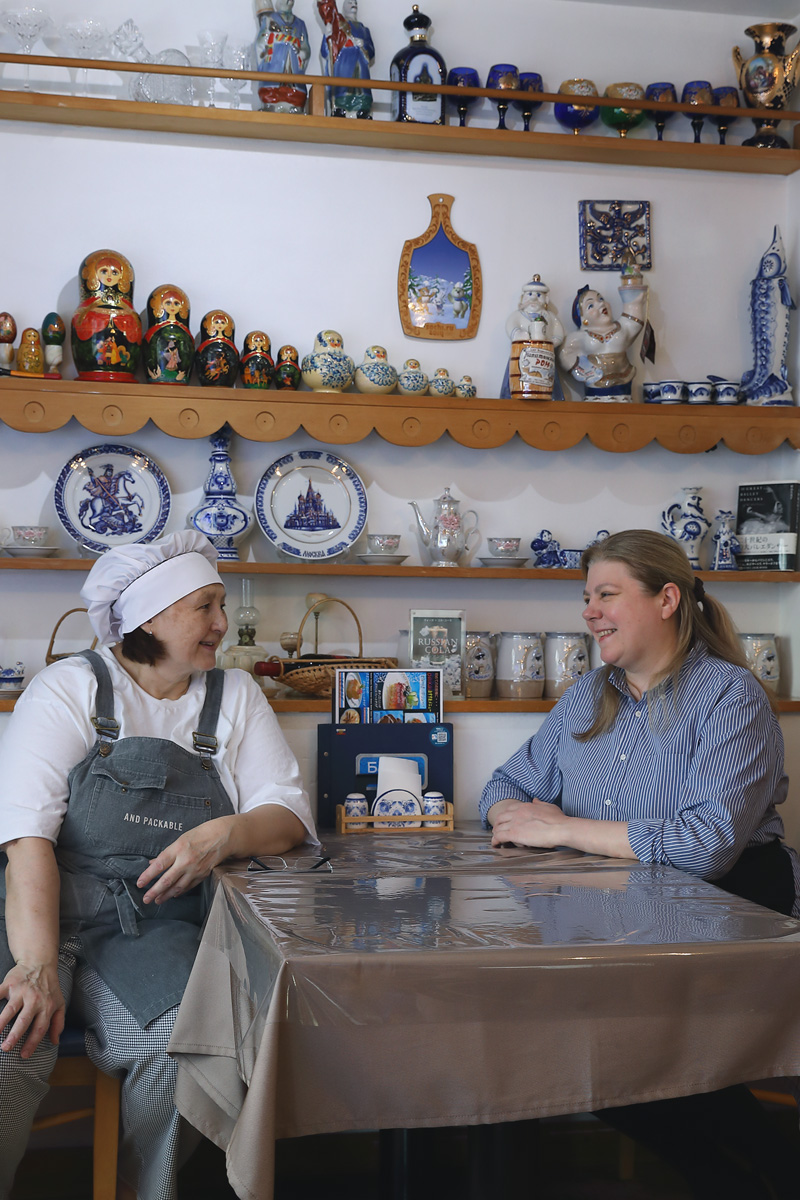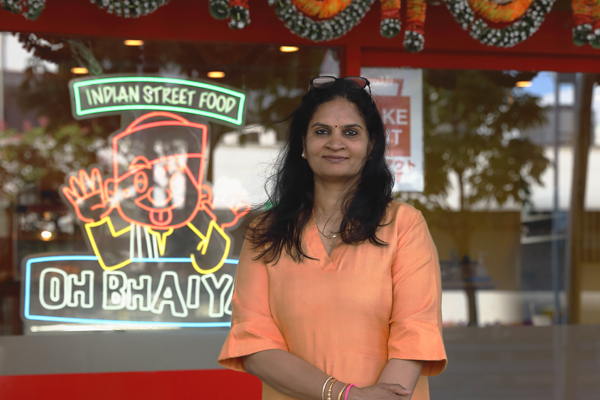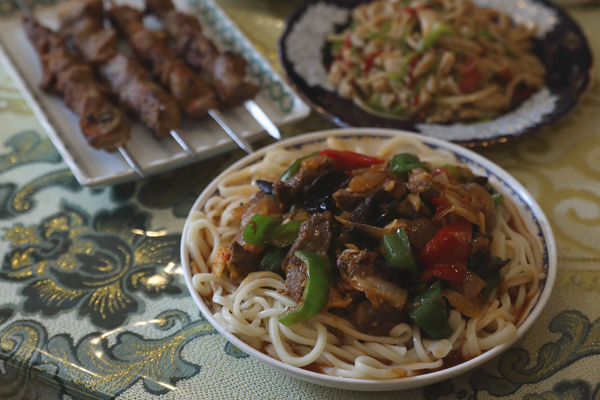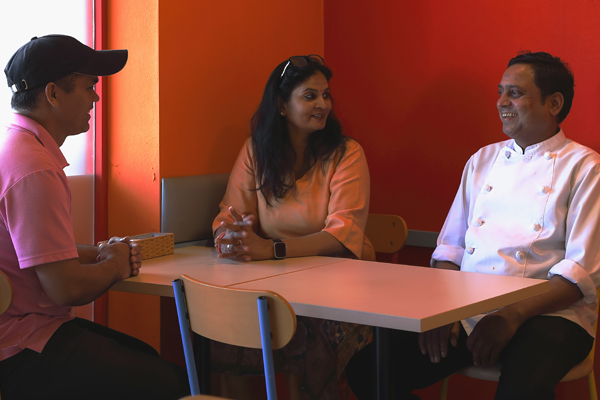初めてのエチオピアが住宅街にあった。四ツ木の「リトルエチオピア レストラン&バー」。
Feature | 2025.6.24

[ リトルエチオピア レストラン&バー ]
在日エチオピア人が多く暮らす街で、
美味しい郷土料理を提供し、暮らしの世話もする。
Little Ethiopia Yotsugi
東京都葛飾区東四つ木3丁目23-6
tel.03-6323-3983
Facebook:https://www.facebook.com/Enkifat.yotsugi/
YouTube:https://youtube.com/channel/UCsyC3m4ENwmxI_KsohvxB6Q
Web:https://little-ethiopia.net/
京成電鉄の四ツ木駅周辺はリトルエチオピアと呼ばれるほど、エチオピア人が多く住む。そんな街の中に「リトルエチオピア レストラン&バー」がある。
普通の住宅街にある店、しかし一歩入ればそこは異国。匂い、装飾品、聞こえる言葉ですっかり海外気分に。女性オーナーのメンベレ・ティベベさんと夫のハイレ・エフレムさんに「リトルエチオピア レストラン&バー」の成り立ちから聞いてみた。「オープンしたのは2016年です。最初はコーヒーショップとしてオープンする予定でした。しかしそこに集まったエチオピア人たちから料理やお酒も出してほしいというリクエストがあり、今のレストラン&バーになりました」。
客の割合は日本人が70%で海外からの観光客が20%。残りの10%が在日エチオピア人というが、もっと多い感覚がある。前回に来たとき、店内にはエチオピア人しかいなかった。「四ツ木には多くのエチオピア人が住んでいて、その人たちを頼って、またエチオピア人がやって来る。それを繰り返しているうちに人数が増えてきました。新しくやって来たエチオピア人が家を借りたり、仕事を探す手伝いを僕がしています」。面倒見のいいエフレムさんのもとにみんなが集まる。
日本人がエチオピアと聞いて思い浮かべるのはマラソンとコーヒーくらいか。そんなエチオピアってどんな国だろう。「エチオピアは古く、人類が始まった国ともいわれています。80以上の言語があり、顔つきや肌の色もさまざまです。文化も豊かで、宗教はエチオピア正教というキリスト教の他にイスラム教もあるけど一度も喧嘩をせずに仲良くやっています」。
エチオピア人は陽気で人が良く、みんなで集まるのが大好き。「エチオピアにはコーヒーセレモニーというものがあります。まず、コーヒーをより美味しくする香りのインセンスを焚きます。その匂いにつられて人が集まる。ときには通りすがりの人も来ます。みんなが集まり、コーヒー豆を焙煎し、ジャバナという土器のポットでコーヒーを淹れます。1時間以上かけてセレモニーをすることもあります。その間、お喋りをしながらさまざまな情報を交換します。エチオピア人にコーヒーセレモニーは欠かせません。ウチの店でもやっていますよ」。
「リトルエチオピア レストラン&バー」ではほとんどの料理はトラディショナル。エチオピアの日常食は、日本ではなかなか食べられない。「シェフはエチオピア人だし、たまに僕の奥さんも料理づくりを手伝います。日本にない食材は輸入します。だから味は本物。普段もエチオピア人が来ますが、エチオピアのナショナルデイをはじめキリスト教やイスラム教の祭事がある日、そして結婚式や誕生日など、イベントのある日は特に盛り上がります」。
エフレムさんは奥さんと娘の日本のビザを取るために何年も奮闘し、その様子はNHKのドキュメンタリー番組にもなった。「いまは奥さんと二人の子どもがいて、楽しく暮らしています。これからも家族とエチオピアの仲間たちと、日本で暮らしていきたいと思っています」。
近くの工場や商店街で働く人たちが、同じ国の仲間と食事やお酒、コーヒーを楽しみに「リトルエチ オピアレストラン&バー」に集まる。そんな場所があるエチオピア人たちがうらやましく思えた。
My First Taste of Ethiopia Was in a Residential Neighborhood:
Little Ethiopia Restaurant & Bar in Yotsugi.
In a neighborhood with a strong Ethiopian presence,this welcoming spot
offers authentic dishes—and a helping hand with everyday life.
The area around Yotsugi Station on the Keisei line is home to so many Ethiopians, it’s nicknamed “Little Ethiopia.” Tucked into this neighborhood is the Little Ethiopia Restaurant & Bar.
It’s located in an ordinary residential area, but step inside, and you’re transported. The aromas, décor, and language create the feeling of being in another country. I spoke with the owners, Membele Tibebe and her husband, Haile Efrem, about how the restaurant began. “We opened in 2016. Originally, we planned just a coffee shop,but local Ethiopians asked us to serve food and alcohol too—so it became a full restaurant and bar.”
About 70% of customers are Japanese, and 20% are foreign visitors. Only 10% are Ethiopian residents, but it feels like more. Last time I visited, the place was filled entirely with Ethiopians. “Many Ethiopians live in Yotsugi. Others move here to be near them, and over time, the community has grown. I help newcomers find housing and work.” Under Efrem’s warm care, people naturally gather.
To many Japanese, Ethiopia means coffee and marathons. But what is it really like? “It’s ancient—some say the birthplace of humanity. There are over 80 languages, and people vary in looks and skin tone. It has rich culture, and both Ethiopian Orthodox Christianity and Islam coexist peacefully—we’ve never had religious conflict.”
Ethiopians are cheerful and community-oriented. “We have a tradition called the coffee ceremony. We burn incense to enhance the aroma, which draws people in—even passersby. Then we roast beans and brew coffee in a clay pot called a jebena. It can take over an hour, with lots of chatting and sharing news. It’s essential to our culture—we do it here at the restaurant, too. ”
Most dishes at Little Ethiopia are traditional. Ethiopian everyday foods are rare in Japan. “Our chef is Ethiopian, and sometimes my wife helps in the kitchen. We import ingredients you can’t get in Japan, so the flavor is authentic. Ethiopians visit regularly, but the place really comes alive on holidays—Ethiopia’s national day, religious festivals, weddings, and birthdays.”
Efrem spent years fighting to obtain visas for his wife and daughter—a story that was featured in an NHK documentary. “Now I live happily with my wife and two children. I want to continue living in Japan—together with my family and Ethiopian friends.”
Workers from nearby factories and shopping streets come to enjoy food, drinks, and coffee with fellow countrymen at Little Ethiopia. I found myself envying the Ethiopians for having a place like this.

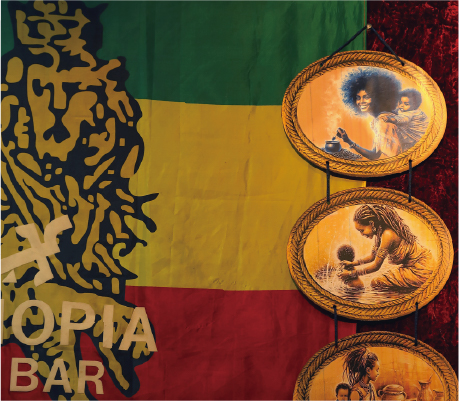
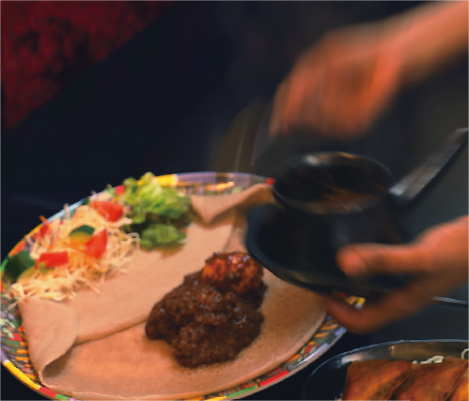

閲覧中の特集はこちら
